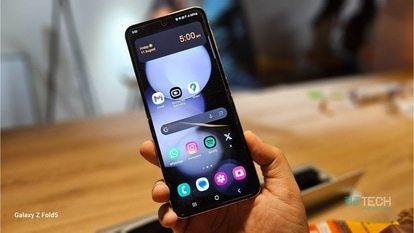Got a baby face? Don't run for office
A more babyfaced individual is perceived as less competent than a more mature-faced, but equally attractive, says a study.
A baby face may win hearts but it doesn't win votes, US researchers said on Thursday.
Students picked the winning US congressional candidate nearly 70 per cent of the time merely by glancing at their photos and deciding which one looked more competent, they said.
'This remarkable effect ... likely reflects differences in 'babyfacedness,'' Leslie Zebrowitz of Brandeis University and Joann Montepare of Emerson College, both in Massachusetts, wrote in a commentary.
For their study, Alexander Todorov and colleagues at Princeton University showed pairs of photographs of real candidates for Congress, winners and losers, to more than 800 students.
They asked them to choose the candidate they thought had won or would win, and asked them why. On average, the volunteers looked at each pair of photos for one second.
The students chose correctly 68.8 per cent of the time, Todorov and colleagues report in this week's issue of the journal Science.
'In one of our studies, 143 participants were asked to rate the importance of 13 different traits in considering a person for public office. These traits included competence, trustworthiness, likability, and 10 additional traits,' the researchers said.
'Competence was rated as the most important trait.'
And the students correctly chose the winner based on how competent he or she looked in 71.6 per cent of the Senate races and in 66.8 per cent of the House of Representatives races.
Zebrowitz, who wrote a book entitled 'Reading Faces: Window to the Soul?,' and Montepare said it boils down to having a baby face.
'A more babyfaced individual is perceived as less competent than a more mature-faced, but equally attractive, peer of the same age and sex,' they wrote.
YES, WE ARE SHALLOW
'Although we like to believe that we 'don't judge a book by its cover,' superficial appearance qualities such as babyfacedness profoundly affect human behavior in the blink of an eye.'
Zebrowitz said different cultures generally agree on what gives a person a baby face -- a round face, large eyes, small nose, high forehead and small chin.
'The data we have suggest that we're not necessarily electing better leaders -- people who are actually more competent, though we are electing people who look the part,' she said in a statement.
Todorov agreed.
'Our findings have challenging implications for the rationality of voting preferences, adding to other findings that consequential decisions can be more 'shallow' than we would like to believe,' he wrote.
Todorov's team said they took into account possible other factors in their study, and ruled them out.
'We also ruled out the possibility that the age, attractiveness, and/or familiarity with the faces of the candidates could account for the relation between inferences of competence and election outcomes,' they wrote.
'For example, older candidates can be judged as more competent and be more likely to win. Similarly, more attractive candidates can be judged more favourably and be more likely to win.'
'As Darwin recollected in his autobiography, he was almost denied the chance to take the historic Beagle voyage -- the one that enabled the main observations of his theory of evolution -- on account of his nose,' the researchers concluded.
'Apparently, the captain did not believe that a person with such a nose would 'possess sufficient energy and determination.''
Catch all the Latest Tech News, Mobile News, Laptop News, Gaming news, Wearables News , How To News, also keep up with us on Whatsapp channel,Twitter, Facebook, Google News, and Instagram. For our latest videos, subscribe to our YouTube channel.

























